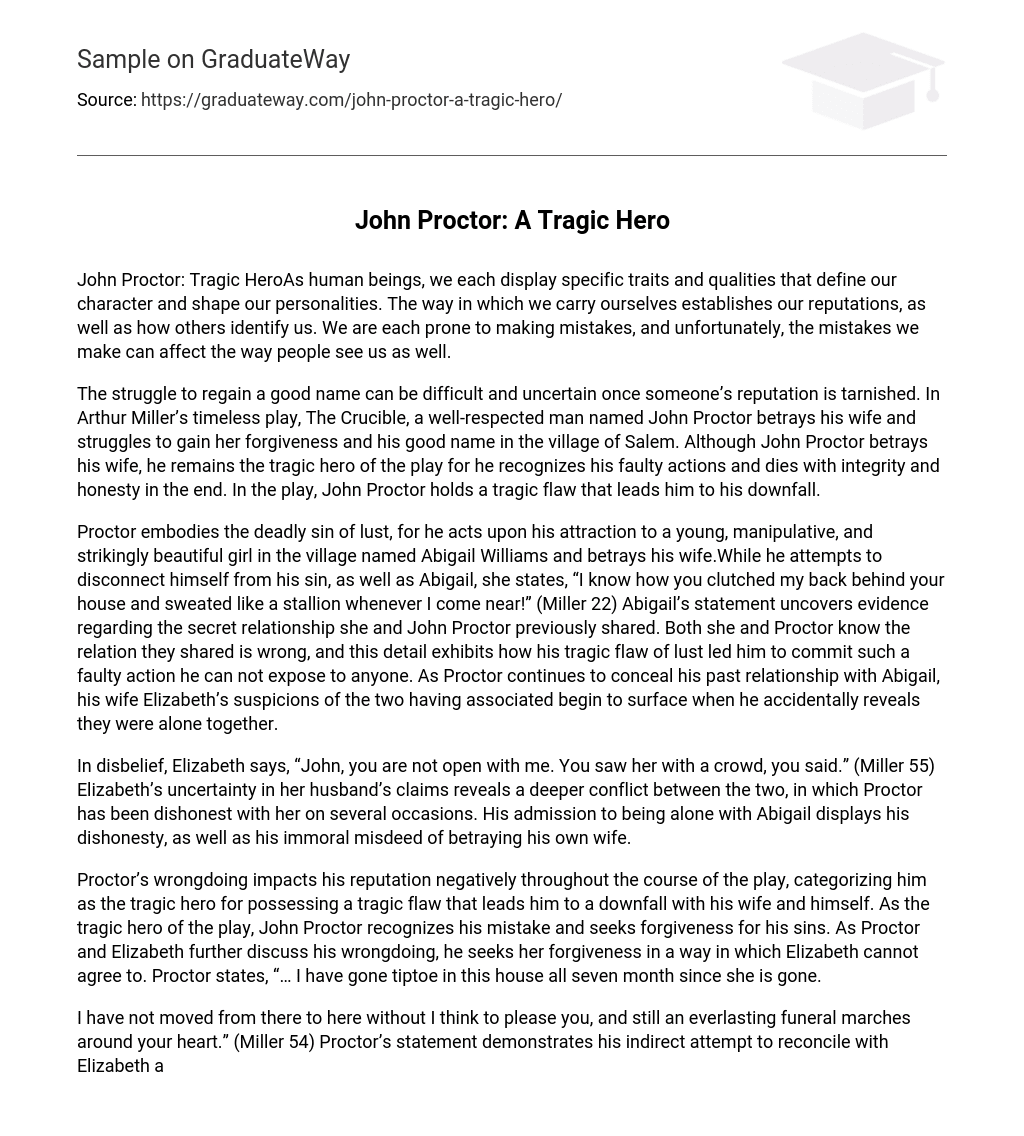John Proctor: Tragic HeroAs human beings, we each display specific traits and qualities that define our character and shape our personalities. The way in which we carry ourselves establishes our reputations, as well as how others identify us. We are each prone to making mistakes, and unfortunately, the mistakes we make can affect the way people see us as well.
The struggle to regain a good name can be difficult and uncertain once someone’s reputation is tarnished. In Arthur Miller’s timeless play, The Crucible, a well-respected man named John Proctor betrays his wife and struggles to gain her forgiveness and his good name in the village of Salem. Although John Proctor betrays his wife, he remains the tragic hero of the play for he recognizes his faulty actions and dies with integrity and honesty in the end. In the play, John Proctor holds a tragic flaw that leads him to his downfall.
Proctor embodies the deadly sin of lust, for he acts upon his attraction to a young, manipulative, and strikingly beautiful girl in the village named Abigail Williams and betrays his wife.While he attempts to disconnect himself from his sin, as well as Abigail, she states, “I know how you clutched my back behind your house and sweated like a stallion whenever I come near!” (Miller 22) Abigail’s statement uncovers evidence regarding the secret relationship she and John Proctor previously shared. Both she and Proctor know the relation they shared is wrong, and this detail exhibits how his tragic flaw of lust led him to commit such a faulty action he can not expose to anyone. As Proctor continues to conceal his past relationship with Abigail, his wife Elizabeth’s suspicions of the two having associated begin to surface when he accidentally reveals they were alone together.
In disbelief, Elizabeth says, “John, you are not open with me. You saw her with a crowd, you said.” (Miller 55) Elizabeth’s uncertainty in her husband’s claims reveals a deeper conflict between the two, in which Proctor has been dishonest with her on several occasions. His admission to being alone with Abigail displays his dishonesty, as well as his immoral misdeed of betraying his own wife.
Proctor’s wrongdoing impacts his reputation negatively throughout the course of the play, categorizing him as the tragic hero for possessing a tragic flaw that leads him to a downfall with his wife and himself. As the tragic hero of the play, John Proctor recognizes his mistake and seeks forgiveness for his sins. As Proctor and Elizabeth further discuss his wrongdoing, he seeks her forgiveness in a way in which Elizabeth cannot agree to. Proctor states, “… I have gone tiptoe in this house all seven month since she is gone.
I have not moved from there to here without I think to please you, and still an everlasting funeral marches around your heart.” (Miller 54) Proctor’s statement demonstrates his indirect attempt to reconcile with Elizabeth and the immense amount of time he has felt sorry for his wrongdoing.His recognition of his faults and his attempts to resolve them demonstrate the qualities he embodies as a tragic hero. John Proctor also exhibits his recognition of his sins when he says, “When will you know me, woman? Were I stone I would have cracked for shame this seven month!” (Miller 62) He uses a stone to symbolize himself as being able to be damaged by his guilt and remorse, demonstrating his capability to recognize his own actions and feel repentance for them.
Proctor attempts to redeem himself and show Elizabeth he is an honest man and that he is truly sorry for his wrongdoings. His ability to admit to his wrongdoings and his efforts to mend his relationship with his wife, and himself, categorize him as the tragic hero of the play. John Proctor sought his wife’s forgiveness to regain her trust and to entitle him to die an honest man. He recognized his actions; he simply wanted his wife to recognize them too.
“Let you look sometimes for the goodness in me, and judge me not.” (Miller 55) Proctor’s appeal to his wife reveals his hope for her forgiveness and for her to see the goodness in him. He wants his wife to recognize him as an honest man, because to him that is the only substance that made him feel like a good person. Later in the course of the play, Elizabeth forgives Proctor for his mistakes.
She states, “John, it come to naught that I should forgive you… Whatever you will do, it is a good man does it… it needs a cold wife to prompt lechery.” (Miller 136-137) Elizabeth’s statement to her husband exhibits an understanding of his mistakes and acknowledgement of the good man Proctor truly is. Elizabeth’s forgiveness allows Proctor to forgive himself as well. After being forgiven, John Proctor can now die an honest man, a tragic hero – a man with integrity and goodness.
In Arthur Miller’s play, The Crucible, it is evident that John Proctor is the tragic hero.Concluding through evidence in the play, it is fairly simple to connect him with separate parts of the definition. He makes his share of mistakes, just as many human beings do. John Proctor is fundamentally a good man, with respectable intentions and an appropriate moral code.
He recognizes his own mistakes and makes efforts to repair the damage he has made. He is forgiven, and his honesty and goodness can now be restored. His suffering was meaningful, but not entirely deserved. Bringing all of these parts together, we can say that John Proctor is truly a tragic hero.





